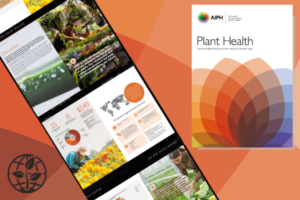
Survey identifies promising global industry investment in plant health and biosecurity
The AIPH International Plant Health Survey 2021 reveals the promise of a bio-secure future for the ornamental horticultural industry. It shows a strong commitment to plant health systems, with scope for an international framework.
The survey was part of the International Year of Plant Health 2020 and in response to growing concerns about biosecurity worldwide, and the ornamental horticulture industry’s duty to sustainability. International travel and trade have tripled in volume in the last decade and has the potential to quickly spread pests and diseases around the world, causing significant damage to native plants and the environment.
The survey aimed to explore how industry organisations work to enhance plant biosecurity in their regions and share information on voluntary systems to improve biosecurity within businesses and across supply chains. The Plant Health industry support programmes have the capacity to enable healthy production systems, cost-effective and reliable movement of low-risk plant material within global supply chains, and traceability in the event of a biosecurity threat.
Through the report, AIPH concluded:
- Voluntary standards are increasingly relied upon by industry and regulators to reduce the risk posed by plant pests for national or international trade. Eleven voluntary standards for Plant Health Management were identified from around the world. The highest perceived level of threat from plant pests and diseases in a respondent’s country or region was ‘trade in live plants and cut flowers’ with the second-highest level being identified as ‘growing systems’.
- There is a basis for creating an international equivalence framework between standards.
- Voluntary standards and associated schemes co-designed by industry and the competent (designated) authority for a country, can augment phytosanitary measures and regulatory systems.
A ‘systems approach’ for plant biosecurity for nursery production systems and supply chain management was a key concept that emerged from the survey. More than three quarters (77.5 percent) of those surveyed indicated a need for a voluntary international plant health and biosecurity standard. Systems approaches are proactive, aiming to reduce the risk of infestation by promoting the use of safe nursery practices for all pests, and are a fundamental aspect of voluntary standards as the requirements represent policies, procedures, and practices that are integrated into a business’s day-to-day operations.
Tim Edwards, Vice President, AIPH, and Chair of the AIPH Ornamentals Production Committee says, “The report establishes the value of voluntary Plant Health Management schemes. We must now ask, How can the industry broaden uptake of such schemes? What must be done to allow schemes to each recognise and integrate with others? This report starts to identify areas in which Ornamental Horticultural Trade Associations around the globe can work collaboratively to strengthen biosecurity.”
The recommendations highlight the need for further work to develop systems that integrate voluntary industry standards for plant health, with national regulations that control the movement of plants across national and regional borders. This application can be achieved by close collaboration between leaders in the industry and national plant protection authorities (NPPOs). AIPH aims to set up a Global Plant Health Forum to facilitate information sharing and the development of consistency across supply chains.
Ralf Lopian, Chair of International Steering Committee, International Year of Plant Health 2020, is deputy chief plant health officer and coordinates international phytosanitary affairs at Finland’s Ministry of Agriculture and forestry. He says, “The AIPH Plant Health survey is an important commitment of the global ornamental horticultural industry, which relies on international trade, to contribute to the sustainability of its future in supporting plant health. It is particularly essential to consider that prevention is a key aspect and more cost-effective than dealing with full-blown plant health emergencies. Plant pests and diseases do not respect national borders and do not show passports. Plant health capacities and collaboration must be increased on all levels because phytosanitary ambitions succeed or fail with the capacity of the weakest link. The recommendations contained in this report offer a promising roadmap for improved public-private collaboration.”
The full report from AIPH is available to download at: www.aiph.org/ornamentals-production/plant-health-survey-report/
